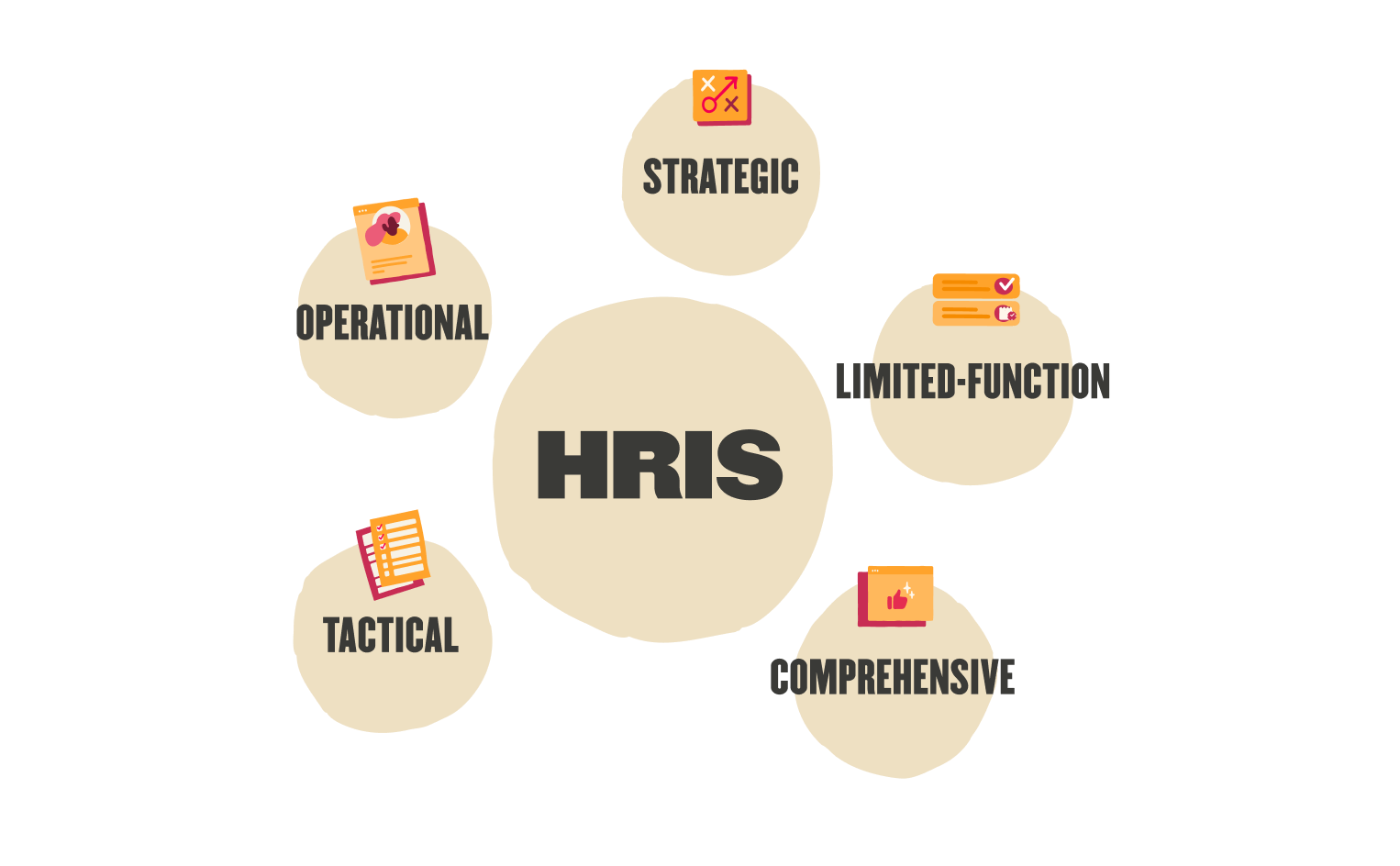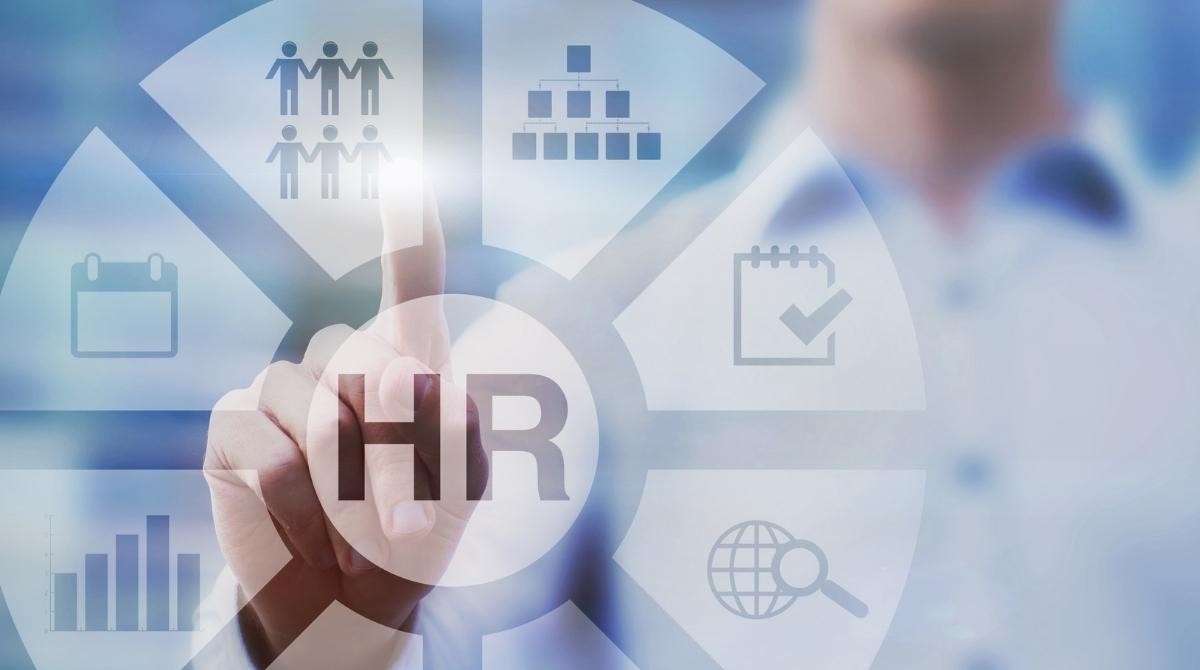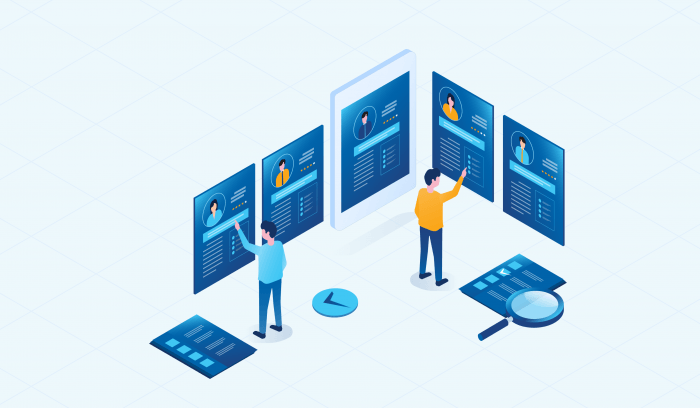What Is An HRIS? HRIS is known as a human resources information system/ software. Keep reading to know more details about HRIS with benefits, features, how to use it and so on.
What Is An HRIS?

HRIS, or Human Resources Information System, is software created to assist firms in meeting essential HR needs and enhancing manager and employee efficiency.
It is similar to the Human Resource Management System (HRMS) and Human Capital Management (HCM), however there are some slight variations between them.
Automation and synced data, which may decrease expensive redundancies and offer a reliable source of choice, respectively, make this possible in major part.
Despite the fact that the majority appear to believe that HRIS refers to the Human Resource Information System, others insist that the "S" actually stands for software.
So which one is correct? Read on below to find out!
HRIS System, HRIS Software, HRIS and HCM
The language for the software that HR professionals use is far from being agreed upon by all. Along with a fourth, less prevalent choice, Human Resource Management System, we see it in all three forms: HRIS, HRIS system, HRIS software (HRMS) and HCM.
But the most typical is just plain old HRIS. This is probably due to the widespread perception that HRIS systems and software are interchangeable.
Though it isn't universally agreed upon what the "S" stands for, adding "system" or "software" isn't necessarily incorrect.
HCM, on the other hand, describes a wide range of people management activities that can be carried out with HRIS and HRMS.
What is HRIS software used for?
Organization and management of people-related data, such as:
- Demographic data on employees, including date of birth, gender, and contact details.
- Information about the employee's employment, including the boss, the department, the pay scales, and other benefit options.
- Requests and balances for time off.
All of this data is collected in one place, making it a reliable source of information that frequently enables users to produce reports that can be utilized to spot trends and make management decisions.
Read more: 23+ Best Employee Time Tracking Software
Benefits of HRIS

There are numerous benefits to using an HRIS.
Organization
You won't ever need to go through file cabinets or check out several spreadsheet iterations again thanks to an HRIS. It is simple to gather, track, update, and search all the data you require in a matter of seconds.
Compliance
A smart HRIS vendor will keep abreast of laws that affect HR and change their software to make it simple for businesses to comply with legal requirements. For example, Tanca just declared that all General Data Protection Regulation (GDPR) standards have been met.
Strategic HR
Less operational work for HR means more time and more resources for strategic HR initiatives that enhance company results. When HR has access to an HRIS, they may use it to monitor the corporate culture, improve retention, and boost productivity.
Employee encounters
Top-tier workers prefer top-tier employers. An effective HRIS can help employees feel more positive about their companies.
A solid HRIS may make working for an organization easier for employees, whether it's through a quick and easy onboarding process, an app that lets them search up a colleague's contact details, or the capability to update or request time off.
Convenience
Due to its practicality and usability, a lot of our clients claim that their HRIS makes them appear to be HR rockstars. Executives are impressed by their quickness in putting out reports, for example, while HR professionals value how little effort is required.
Sum up, an HRIS's advantages frequently outweigh its cost of acquisition. Naturally, you should assess the benefits offered by each HRIS you're considering to be sure you're obtaining the greatest fit for your business.
Do you know what Top Human Resource Management Softwares in 2022?
HRIS software features

HRIS characteristics can vary greatly, however the most popular ones are as follows.
database and directory of employees.
- Tracking of 401ks.
- Candidate monitoring.
- Benefits management.
- Payroll.
- Compliance
- Scheduling.
- Attendance and time.
- tracking of time off.
- Digital signatures.
- Both regular and customizable reports.
- Staff self-service.
More sophisticated systems include capabilities that enable HR executives to enhance the culture and employee experience beyond simple tracking.
- Self-onboarding for employees.
- Performance supervision.
- Mobile apps.
Try not to view the characteristics of an HRIS as a shopping list of things to cross off. One system cannot possibly accomplish everything well just because it makes this claim.
Determine the major issues facing your company, and then gauge your selections based on how effectively the HRIS addresses those issues.
Don't forget to take usability into account. If your program is extremely complicated, nobody will use it, and no one will benefit from it.
So make sure you use the trial before making full payment.
Objectives of human resource information system
A single database that houses application tracking features, employee demographics, onboarding, time-tracking, options for remuneration and benefits and much more is provided by an HRIS.
It serves as the central location for all of your employee data, including the most recent data on hiring patterns and employee retention for your organization.
HRIS examples

You are aware of the functions provided, but how do they actually operate? Various HRIS system examples that can assist you in streamlining significant HR processes include:
Administration of benefits and payroll
Payroll and benefits are among the most time-consuming components of HR. The difficulties associated with these activities are lessened by HRIS databases.
For instance, an HRIS can gather and store information on each employee's benefits and payment. It can track which of your employees are full-time versus part-time and provide them complete access to their benefit information.
This may also assist your staff in determining the kinds of extra advantages that would be beneficial to include in your business.
Applicant tracking for jobs
The majority of HRIS systems offer applicant tracking, which can gather and store all resumes by name and location in one area. Furthermore, using capabilities such as automatic rankings or keyword searches, you may filter resumes and assist in finding the best candidate for the job.
Orientation checklist
Employee self-service functionality offered by HRIS enables HR professionals to email new hires onboarding duties (paperwork, training, etc.) for them to complete ahead of time at their own leisure.
You can create electronic signatures that simplify document completion and welcome emails that facilitate building relationships with prospective coworkers for new hires.
It's critical to keep in mind that, just as no two businesses are alike, no two HRIS systems are either. As a result, some companies may use different HRIS system types than others.
When should your company purchase an HRIS system?

After a certain point, keeping track of all the data about your staff in spreadsheets becomes impracticable (and might even be a compliance issue).
We frequently advise businesses with 25 or more employees to get an HRIS. This scale makes it challenging to compile, update, and track numerous pieces of data for each employee.
Additionally, it becomes challenging for every employee to develop a deep connection with one another. The employee experience and culture must therefore be carefully taken into account by HR. An HRIS allows HR to concentrate on these more important aspects.
Of course, depending on how far along your organization's HR goals are, this list of 20 employees may change. Even though some of our clients have fewer than 20 workers, their executives put a lot of effort into giving HR the tools they require and fostering a great workplace culture.
Using an HRIS enables these smaller companies' HR managers to concentrate on more strategic duties or to manage HR as one of many roles.
What is the maximum number of employees that an HRIS can handle?
The system you select will mostly determine this. Because not every organization is created equal, not every system is either. The requirements of a business with 25 employees and one with 3,000 employees are extremely different.
Some HRIS suppliers promote a one-size-fits-all strategy that, most of the time, doesn't work effectively for anyone. According to these companies, the number of users is almost limitless. We advise enterprises to seek out an HRIS that is targeted at businesses within a particular size range instead.
Although we do assist some very large enterprises with up to 1000 employees, we are aware that our HR software performs at its peak for businesses with between 25 and 500 employees. We put this group's demands first and design our HR software to accommodate them.
How to use the HRIS?
You can follow these instructions to get the most of your HRIS after choosing it.
Accentuate adoption
One of the best methods to make the most of your new system is to make sure that your executives and staff members adopt your HRIS.
Of course, choosing a user-friendly HRIS is the first step, but you may also offer training to make it simpler to use. You can rely on your personnel to update the software as they use it.
You will also gain time savings from their participation in the new procedures. Executives will be able to access their own reports and take use of the extra data when they use the software.
Do it all
Make careful you utilize the software to its full potential. You should make use of what you paid for! Spend some time learning about every feature. Migrate all of your data.
Spend the time necessary, especially if learning new procedures takes some time. If you've chosen a reliable HRIS, the benefits of sticking with the new system will much outweigh the early discomfort of setup and adjustment.
Squeeze the merchant
Your partner should be the HRIS vendor. They ought to be genuinely interested in resolving your issues and promoting your achievement.
Choose an HRIS that appreciates and understands HR, learn about their customer service choices, and enquire about training for both you and your staff. Let them then demonstrate to you how to maximize the use of your HRIS.
Stay current
An inventive HRIS provider will frequently update and enhance their software, so you'll always get more for your money. To take use of the newest and best features, you must, however, make the effort to stay informed about changes.
Work with your vendor's staff for specific inquiries about using your program. The team will be prepared to educate you on everything you need to know if you choose a good HRIS. When picking a provider, you should keep customer service in mind as one of the key considerations.
Why should you use the HRIS system?
Each organization has unique requirements, although some might wish to think about getting an HRIS if they have trouble:
- Human mistakes and data duplication are decreased with HRIS systems.
- Adapt to the changing demographics of the workforce.
- Engage freelancers and independent contractors.
- Keep up with the latest rules.
- Hire personnel with particular knowledge.
- Effectively analyze labor data.
- Maximize team-based organizational models.
Operations in HR are streamlined, effective, and productive as a result. More crucially, with real-time information provided by an HRIS, HR professionals can collect and track reliable data to provide reports. Gaining a thorough grasp of your company's situation and the best ways to spend and save money is made simple as a result.
It can be difficult to manage both people and corporations. However, you'll position your business and staff for success by building a foundation of organization and automated services.
You can use an HRIS to discover your company's strengths, shortcomings, and chances for action by taking a broad view of it.
How to Select an HRIS?
Selecting an HRIS is a crucial choice that could affect whether particular corporate objectives are accomplished. The general steps in the purchasing process are, even though it is not totally linear:
- Determine any issues or difficulties with the present HR processes.
- Examine how an HRIS can assist in overcoming those challenges.
- Make a list of the HRIS needs.
- Utilize the test.
- Checklist should be used to evaluate HRIS vendors.
Common Asked Questions
What is the main objective of an HR information system review?
Supporting the creation, transfer, as well as application of data on human resources or personnel in organizations is the goal of HRIS. Thus, a foundation in a variety of rich literatures is necessary for the effective creation and implementation of HRIS.
What are pros and cons of using HRIS?
Pros | Cons |
|
|
How does HRIS help employees?
Management and staff can communicate about policies and procedures through an HRIS. As a central hub, it may disseminate precise instructions, collect opinions from many staff members and departments, and lessen misinformation.
Finish up
A task that shouldn't be rushed is selecting an HRIS. The correct solution can assist in resolving your company's most pressing issues and free up your HR team to have a significant, strategic influence on your company.
Please feel free to comment if you have any questions about your HRIS research. Tanca would be pleased to assess your company's primary requirements and provide recommendations. The readers of Tanca will also provide you with insightful reviews.












